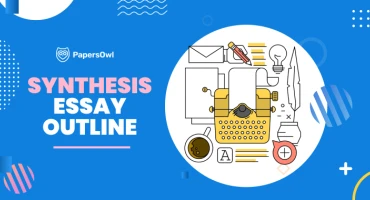Writing is a big part of academic life, and one type of assignment you’ll likely complete during your studies is an explanatory essay. If you’re wondering how to write an explanatory essay, you’re in the right place.
Knowing how to write a compelling explanatory paper is significant for several reasons:
- First, it enables you to succeed in history, science, and language arts in school.
- Second, it helps you explain your thoughts, share knowledge, and think critically.
From this guide, you’ll learn the particularities of the writing process step by step. You’ll find out how to choose the right topic and build a solid outline. You’ll also get helpful writing tips, see real examples, and explore useful topic ideas to get started.
What Is an Explanatory Essay?
This is a form of academic writing that focuses on presenting information clearly and neutrally. The goal is not to argue, persuade, or describe in detail but to simply explain a particular topic or aspect of something so the reader can understand it better.
An author presents facts, research, or ideas in a well-written explanatory essay without adding a personal view. The text should be focused, balanced, and based on credible sources. You may include data, news stories, or real-life examples to support your views and formulate your key idea. A persuasive thesis statement, strict body paragraphs, and a clear conclusion are all part of a typical explanatory essay format.
This type of academic paper aims to briefly introduce a topic, deliver background information, clarify the key points, and help the reader gain a clear understanding. Unlike descriptive essay writing, which focuses on sensory details and vivid imagery, explanatory writing focuses on facts and clarity. It’s useful in school assignments, research work, and explanatory articles on real-world topics like the printing press, mental health, or historical events like the French Revolution.
In short, if you have to create an explanatory essay, your goal is to explain – not argue, not explore – just explain it clearly and support it with facts.
Purpose of Completing an Explanatory Essay
The main goal of an explanatory text is to help the reader understand a topic clearly. Teachers assign these tasks to build important academic skills. This type of academic writing can teach you how to:
- Formulate information in a clear and organized way;
- Use thorough research to prove your points;
- Write an accurate thesis statement;
- Explain complex ideas with simple words;
- Structure your thoughts.
You might be asked to explain:
- A process (like how the printing press changed the world);
- An idea (like how mental health affects students);
- An event (like the civil rights movement);
- A situation (like how social media influences young people).
Explanatory essay writing allows you to learn to think critically, enhance your writing skills, and become better at sharing ideas. You’ll use these skills not just in school, but in real life, too. Learning how to explain ideas well also prepares you for other types of writing, like knowing how to write an exploratory paper where you examine various viewpoints on a subject.
5 Types of Explanatory Essays
There are numerous types of explanatory essays, each with a different purpose. The type you choose depends on what you try to explain and how you wish to organize your thoughts. Here are the main types, along with short examples to help you comprehend them more easily:
- Definition Explanatory Essay: This type explains the meaning of a concept or term.
- Cause-and-Effect Explanatory Essay: It explores the reasons something happens and what happens as a result.
- How-To Explanatory Essay: This type gives clear steps to do something or how something works.
- Compare-and-Contrast Explanatory Essay: It shows the similarities and differences between two or more subjects.
- Classification Explanatory Essay: It breaks down a topic into categories or types.
Each type helps you organize your ideas coherently and logically explain the topic. If you’re unsure where to start, looking through good explanatory essay topics can guide you toward the best option.
Guide for a Well-Written Explanatory Essay
Try to break the process into clear steps when you complete an explanatory essay. From selecting a topic to improving your final draft, this guide will walk you through every stage. You’ll learn how to organize ideas, present evidence, and confidently complete your assignment.
Pre-Writing Steps
Before you start writing, it’s important to plan. The first step in the writing process is topic selection.
Step 1: Topic Selection
Choose an interesting topic that you understand well or are curious about. Good explanatory essay topics are clear, specific, and not too broad. For example, “How the printing press changed communication” is better than just “Printing.”
Step 2: Preliminary Research
Next, start preliminary research. Select credible sources like books, news stories, and articles. The more data you have, the easier it is to present information and back it up with trustworthy research. This step helps you explain the main idea without using personal views.
Step 3: Completing a Thesis Statement
Now it’s time to write your thesis statement. It’s the main idea of any text, no matter what examples of explanatory essays you create. A strong thesis is short, clear, and focused on one particular point. It tells the reader what to expect.
- “The printing press made books easier to access and changed education, religion, and society.”
- “Social media adds pressure and weakens real-world relationships for many young people.”
- “The French Revolution was caused by social inequality, poor leadership, and economic crisis.”
Your thesis statement is the core of your explanatory paper. It allows you to stay on track and provides your reader with a clear understanding of what you’re explaining.
Outlining the Essay
Before you start writing, it helps to create an outline. It is a straightforward plan that demonstrates how your paper will be organized. It keeps your thoughts in order and makes the writing process smoother. You don’t need anything fancy, just a clear structure that guides your work from beginning to end.
Here’s what your outline should include:
- Introduction – It sets the tone for the rest of the paper. It has to grab attention, deliver context, and lead into your key idea.
- Body paragraphs – They explain the essential points of your topic with facts and examples. Each one should concentrate on one essential idea.
- Conclusion – It sums up the ideas and restates the key point. It must give the reader something to think about.
📥 We’ve created a ready-to-use explanatory essay outline you can download. This sample is flexible – feel free to add more body paragraphs if it’s better for your research. Once you’ve filled it out, you’ll have a path to follow as you complete your document.
Writing Your Explanatory Essay
✅ Introduction
A good introduction presents the subject and formulates the thesis. Here’s how to do it:
- Start with a hook. Begin with a sentence that sparks curiosity. This could be a question, a quote, or a surprising fact.
- Give background information. Add several sentences to explain the topic. They will help the reader grasp what you’re talking about and why it matters.
- State your thesis. Your thesis statement is the essential point of your essay. Keep it clear and focused on one idea.
- Preview your points. Quickly mention the main ideas you’ll cover.
Keep your explanatory essay introduction within one or two paragraphs. It should be brief.
✅ Body Paragraphs
The body paragraphs of your essay explain the details of your topic. Each one should clarify one point and follow a strict structure:
- Start with a point. Begin with a sentence that introduces what the paragraph is about.
- Provide evidence. Use facts, quotes, or research to support your point. Always choose credible sources, such as reliable research works, news articles, or expert opinions.
- Explain the evidence. Don’t just drop in a quote. Say why it matters and how it connects to your point.
- Link back to your thesis. End the paragraph by tying everything together.
In the body paragraphs, use the PEEL rule to stay organized and follow a clear explanatory essay structure:
P – Point (state the idea)
E – Evidence (give facts or examples)
E – Explanation (make the idea clear)
L – Link (connect to the next point)
For example, if you’re writing about the French Revolution, one paragraph might explain the role of economic problems. Add linking words like furthermore, however, or for example to keep the flow.
✅ Conclusion
Your explanatory essay conclusion wraps up all your thoughts. Don’t just repeat your position. Think about making this section meaningful.
Here’s how to sum up your ideas effectively:
- Restate the thesis. Remind the reader of your main argument without copying it word for word.
- Summarize your points. Briefly mention the main ideas again.
- Offer insight or a takeaway. End with a final thought, recommendation, or quote.
Revising and Editing
Take time to review. Use a checklist to revise your explanatory article. Check your structure, spelling, grammar, and word flow. Is each paragraph clear? Are all your sources trustworthy?
Here are some writing tips to improve your final draft:
- Make sure your ideas are easy to follow;
- Keep your sentences short;
- Avoid repeating the same words;
- Use active voice when possible;
- Check your word count to stay on track.
A well-written explanatory essay demonstrates that you know the topic and can explain it in a way others will understand. Great explanatory writing takes time, thought, and strict structure, whether you’re writing about mental health, a close person, or a major event.

How to Reference Sources in an Explanatory Essay?
Even if your text isn’t a research project, you still need to give credit when you use facts, quotes, or ideas from someone else. This shows you’ve done deep research and helps your audience trust what you’re talking about. It also helps you avoid plagiarized information.
Understanding how to start an explanatory essay includes knowing when and how to cite sources correctly from the very beginning. Add in-text citations and a full list of sources at the end. The most common styles are APA, MLA, and Chicago. Ask your teacher which one to use.
APA Style (science and social studies):
In-text: (Smith, 2022)
Reference: Smith, J. (2022). Understanding Climate Change. Green Press.
MLA Style (English and humanities):
In-text: (Smith 22)
Works Cited: Smith, John. Understanding Climate Change. Green Press, 2022.
Chicago Style (history):
Footnote: John Smith, Understanding Climate Change (Green Press, 2022), 22.
Bibliography: Smith, John. Understanding Climate Change. Green Press, 2022.
No matter the style, here are some key tips:
- ✅ Use in-text citations when using facts or quotes;
- ✅ Include a References, Works Cited, or Bibliography page;
- ✅ Stick to credible sources: books, articles, and reliable websites;
- ✅ Don’t rely on guesses, use real evidence;
- ✅ Remember: correlation doesn’t prove cause.
7 Key Mistakes to Avoid in an Explanatory Essay
| 🚩 Mistakes | 🤝 How to Avoid |
| Adding personal opinions | An explanatory essay is about facts. Stick to clear information, not your personal beliefs. |
| Turning it into a persuasive essay | Your goal is to explain, not convince. Refrain from using emotional or opinion-based arguments. |
| Picking a topic that’s too broad | Narrow your focus so your writing stays clear and organized. |
| Doing little or no research | Strong essays need facts. Base your work on trusted sources to back up your points. |
| Poor explanatory essay format or structure | Follow a clear structure: introduction, body paragraphs, and a summarising section. |
| Not citing your sources | Always use proper citations and include a references page. |
| Weak or unclear thesis statement | Make your main idea strong and easy to understand. |
Explanatory Essay Example
Here’s a short sample to give you an idea of what an explanatory essay looks like. Each part has a clear role. The structure is simple, but effective.
Topic: How the Printing Press Changed the World
Introduction:
Before the printing press, books were copied by hand, making them rare and expensive. In the 1400s, Johannes Gutenberg changed everything with his invention. This essay will explain how the printing press led to big changes in education, religion, and society.
👉 This part gives background, introduces the topic, and ends with a thesis statement.
Body Paragraph 1:
The printing press made books easier to produce. Now more people can read and learn.
👉 This paragraph explains one main point – how access to books increased.
Body Paragraph 2:
It helped spread new ideas quickly, including religious ones. This led to events like the Reformation.
👉 Here, the writer explains how the press affected religion and history.
Body Paragraph 3:
With more books and readers, literacy rates grew, and knowledge became more available.
👉 This paragraph shows how society changed as a result.
Conclusion:
The printing press had a big impact. It changed how people learned, thought, and shared information, and its influence is still felt today.
👉 The conclusion restates the big idea and shows why it matters.
Pro Tips for Writing a High-Quality Explanatory Essay
- 🚀 Use authoritative sources like books, academic journals, and expert websites. Avoid blogs or social media posts.
- 🚀 To connect your ideas smoothly, use transition words such as first, in addition, however, and as a result.
- 🚀 Stick to one main point per paragraph to keep things clear.
- 🚀 Follow a clear outline so your ideas stay organized from start to finish.
- 🚀 Reread your essay to make sure everything flows and makes sense.
- 🚀 Keep your writing simple and clear. Don’t try to sound too fancy.
Explanatory Essay Topics
Choosing a good explanatory essay topic is the first step to writing something interesting and clear. A strong topic helps you explain how or why something works, what caused it, or how it compares to something else. Below are some great ideas organized into simple categories to get you started.
General Topics
- How do vaccines protect our bodies from illness?
- Why is recycling important for the planet?
- What happens in the brain when we remember things?
- How do habits form, and why are they hard to break?
- What causes the different seasons of the year?
- Why do we need sleep, and what happens if we don’t get enough?
- How do emotions affect the way we make decisions?
- What are the benefits of learning a second language?
- How do plants grow from tiny seeds into full-grown trees?
- What makes laughter good for your health?
School-Related Topics
- How does online learning change the way students learn?
- What are the qualities of a great teacher?
- How does working in groups help students understand better?
- Why do students sometimes wait until the last minute to study?
- What are the effects of too much homework?
- How do school uniforms affect student behavior?
- Why is physical education important in schools?
- How do school clubs help students grow socially?
- What role does school lunch play in student health?
- How do standardized tests impact student performance?
Historical Topics
- What caused the fall of the Roman Empire?
- How did the French Revolution shape Europe?
- What roles did women play during World War II?
- Why did the Cold War start, and what was it about?
- How did the Great Depression affect everyday families?
- What events led to the Civil Rights Movement in the U.S.?
- How did new inventions change lives during the Industrial Revolution?
- Why did the American Revolution begin?
- How did the printing press help spread knowledge?
- Why was the Berlin Wall built, and why was it torn down?
Social Topics
- How does mental health affect how students perform in school?
- Why do strong friendships matter in our lives?
- What is social media doing to the way young people communicate?
- How do family values shape who we become?
- Why is kindness important in a community?
- What are the long-term effects of bullying?
- How do traditions help keep cultures alive?
- Why is volunteering good for both the helper and the community?
- How does peer pressure influence decision-making?
- What makes a community feel safe and supportive?
Tech and Science Topics
- How does artificial intelligence help us in daily life?
- What was the printing press, and why was it a game-changer?
- How do electric cars work, and why are they better for the planet?
- What is virtual reality, and where is it used today?
- How does GPS help us find our way?
- Why is exploring space still important today?
- How does climate change affect the oceans and sea life?
- What do smartphones do to our attention span?
- How do vaccines teach the immune system to fight off disease?
- What causes global warming, and how can we slow it down?
These good explanatory essay topics help you start writing a clear and engaging paper. Choose one that interests you and break it down step by step!

Final Thoughts
Now that you’ve learned the explanatory essay definition and understand how to complete this paper step by step, you’re ready to start writing! You can choose a specific topic, create an explanatory essay outline, and write clear body paragraphs supporting your main idea.
Just remember: pick a topic you understand, do solid research using credible sources, and follow a clear structure. Begin with a strong explanatory essay introduction, explain each point with facts and examples, and wrap it up with a strong conclusion. Remember to use linking words and transition words to connect your thoughts smoothly.
Don’t confuse it with a persuasive essay. This type of writing is not about sharing personal opinions or convincing others. An expository essay or explanatory paper focuses on helping the reader understand a particular point by presenting information clearly and without bias.
With time and practice, you can write a solid essay that shows your strength in academic writing and makes even complex ideas easier to follow. Keep the structure in mind, support your points with evidence, and take your time to revise.
Your next explanatory article could be your best one yet!




